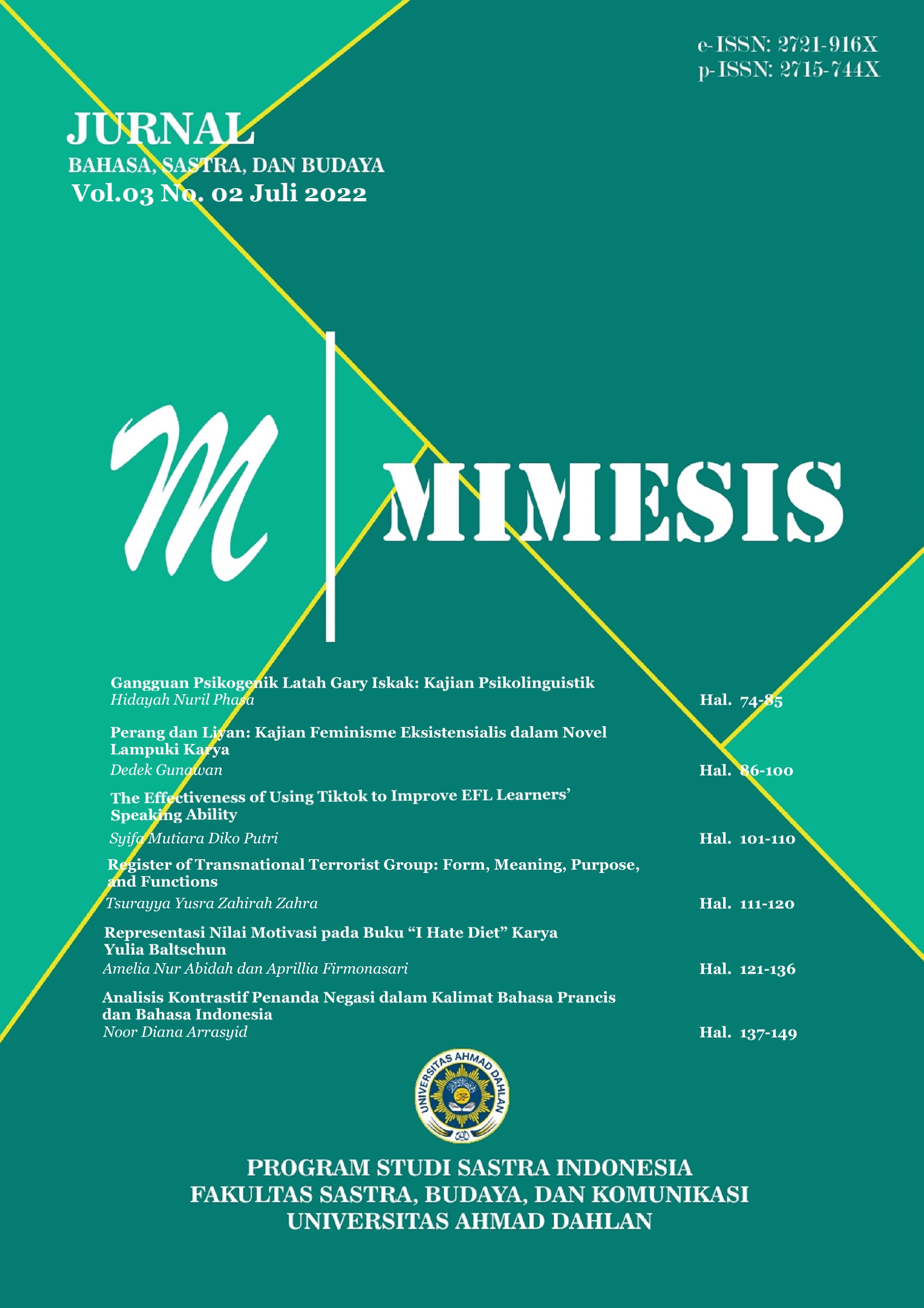THE EFFECTIVENESS OF USING TIKTOK TO IMPROVE EFL LEARNERS’ SPEAKING ABILITY
DOI:
https://doi.org/10.12928/mms.v3i2.6096Keywords:
EFL Learners, Speaking , TikTokAbstract
People are drawn to the internet as technology progresses. During the COVID-19 pandemic, technology has become a requirement in the education sector. Therefore, the researchers want to find the effectiveness of TikTok in improving EFL learners' speaking ability. The subject of this paper was 20 from the English Educational Study Program at Tidar University. This study used the qualitative research method. Based on the researchers' study with 20 students from the English Educational Study Program, the researcher concludes that the TikTok application improved students' speaking skills well. In addition, students' sentiments toward using TikTok in language learning were favorable.
References
Afidah, N., Sari, N. K., & Hanifah, H. (2021). Investigating students’perspectives on the use of tiktok as an instructional media in distance learning during pandemic era. Dinamika: Jurnal Kajian Pendidikan Dan Keislaman, 6(2), 47-68.
Brown, H. D. (2004). Language Testing Book: Principles and Classroom Practice. In Book.
Denzin, N. K., & Lincoln, Y. S. (2008). Introduction: The discipline and practice of qualitative research.
Ferstephanie, J., & Pratiwi, T. L. (2022). The effect of Tiktok platform to develop students'motivation in speaking ability: a classroom action research. Wiralodra English Journal, 6(1), 1-12.
Frey, B. (2018). The SAGE encyclopedia of educational research, measurement, and evaluation (Vols. 1-4). Thousand Oaks,, CA: SAGE Publications, Inc. doi: 10.4135/9781506326139
Mandasari, M., Kosassy, S. O., & Jufri, Y. (2022, February). Incorporating of social media in distance learning: a case study on how tiktok improve speaking skill among esp students. In International Conference on Government Education Management and Tourism (Vol. 1, No. 1, pp. 1-7).
Pratiwi, A., Uffairah, N. & Sopiah, R. (2021). Utilizing Tiktok application as media for learning English pronunciation. Page 372-382: Proceedings International Conference on Education of Suryakancana.
Yang, H. (2020). Secondary-school Students’ perspectives of utilizing Tiktok for English learning in and beyond the EFL Classroom. Etss, 162-183.
Zaitun, Z., Hadi, M. S., & Indriani, E. D. (2021). TikTok as a media to enhancing the speaking skills of EFL student's. Jurnal Studi Guru Dan Pembelajaran, 4(1), 89-94.
Downloads
Published
Issue
Section
License
Copyright (c) 2022 Syifa Mutiara Diko Putri

This work is licensed under a Creative Commons Attribution-ShareAlike 4.0 International License.
License and Copyright Agreement
In submitting the manuscript to the journal, the authors certify that:
- They are authorized by their co-authors to enter into these arrangements.
- The work described has not been formally published before, except in the form of an abstract or as part of a published lecture, review, thesis, or overlay journal.
- That it is not under consideration for publication elsewhere,
- That its publication has been approved by all the author(s) and by the responsible authorities tacitly or explicitly of the institutes where the work has been carried out.
- They secure the right to reproduce any material that has already been published or copyrighted elsewhere.
- They agree to the following license and copyright agreement.
Copyright
Authors who publish with Mimesis agree to the following terms:
- Authors retain copyright and grant the journal right of first publication with the work simultaneously licensed under a Creative Commons Attribution License (CC BY-SA 4.0) that allows others to share the work with an acknowledgment of the work's authorship and initial publication in this journal.
- Authors are able to enter into separate, additional contractual arrangements for the non-exclusive distribution of the journal's published version of the work (e.g., post it to an institutional repository or publish it in a book), with an acknowledgment of its initial publication in this journal.
- Authors are permitted and encouraged to post their work online (e.g., in institutional repositories or on their website) prior to and during the submission process, as it can lead to productive exchanges, as well as earlier and greater citation of published work.












